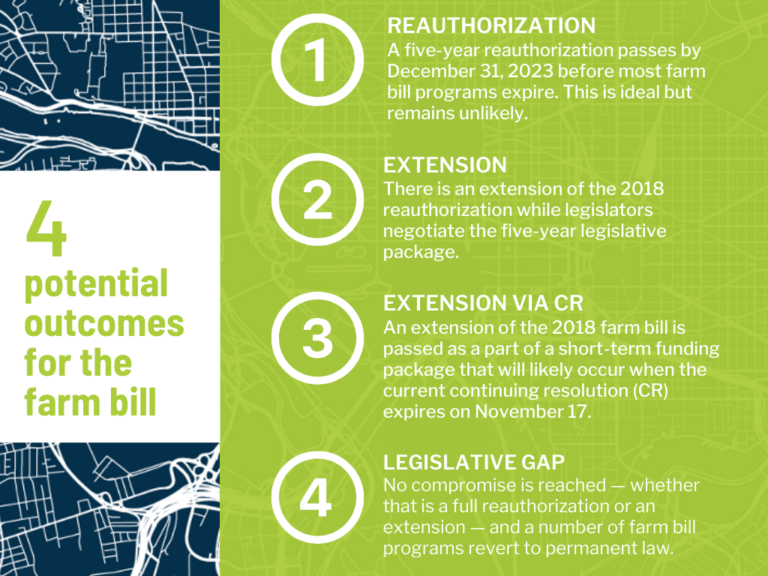With much of the news cycle eaten up by the annual funding fight and analysis on the new Speaker of the House, a less sexy but equally important legislative battle has been brewing for some time now — the farm bill reauthorization.
The House Committee on Agriculture and the Senate Committee on Agriculture, Nutrition, and Forestry are regularly heralded as the most bipartisan committees in Congress, but not even two centuries of reaching across the aisle are immune to the challenges today’s political landscape presents.
The all-important congressional deadline of September 30 has come and gone, but Congress missing the fiscal year deadline for the farm bill is nothing new. Historically, only two farm bills (1997 and 2002) have been enacted before the end of the fiscal year deadline, but with the new year quickly approaching, many agriculture advocates are left wondering what impact the divided Congress will have on the farm bill’s fate.

THE $20 BILLION ELEPHANT IN THE ROOM
According to the most recent available data, the next farm bill is expected to cost approximately $1.4 trillion over the next decade. As the Congressional Budget Office (CBO) continues to drag its feet on updated baseline projections, many legislators are left wondering if that number will continue to creep up — and how they’ll foot the bill. The $20 billion allocated for climate-smart agriculture in the Inflation Reduction Act (IRA) is being targeted by some Republicans as a way to fund critical farm programs, citing that the CBO predicts the Department of Agriculture (USDA) could only get approximately $15 billion of that funding out the door in time. Outgoing Senator Debbie Stabenow (D-MI), Chairwoman of the Senate Agriculture Committee, has made it clear Democrats will fight to keep those funds in conservation. Tensions flared further on the House side when a list of $50 billion worth of potential cuts was recently leaked, raising concerns among Democrats regarding House Agriculture Ranking Member David Scott’s (D-GA) negotiating chops.
HOUSE VS. THE SENATE
Nearly a month after the ousting of former House Speaker Kevin McCarthy (R-CA) and after four Republican speaker nominees, the House finally elected the deeply conservative, lesser-known Mike Johnson (R-LA) as Speaker. In a dear colleague letter to Republicans, Speaker Johnson detailed his ambitious plan to consider the agriculture appropriations bill on the House floor the week of November 13 and pass the House’s farm bill in December. While Speaker Johnson voted in favor of the 2018 farm bill, he has been a strong supporter of spending cuts and tightening restrictions on the Supplemental Nutrition Assistance Program (SNAP), which accounts for more than 80% of farm bill funding, calling it “our nation’s most broken and bloated welfare program.” His sense of urgency is a positive, but it remains to be seen if Speaker Johnson will be able to rally enough farm bill skeptics within his conference without losing bipartisan farm bill support before the deadline.
Former House Speaker Kevin McCarthy (R-CA) was a farm bill ally during his time as Speaker and understood the need for a bipartisan bill. With Republicans’ razor-thin majority in the House, any draft including major changes to Democratic priorities, such as climate and nutrition programs, would surely be met with a swift defeat. Democrats, however, aren’t the Committee’s only worry. Despite more than 90% of American farmland falling into Republican districts, several conservatives have or could vote against a farm bill outright simply due to the price tag. Additionally, due to ample turnover in the House in recent years, approximately 200 members have never voted on a farm bill before, leaving a huge legislative learning curve for both Republicans and Democrats.
Across the Capitol, the typically tempered Senate is beginning to let its frustrations show. Senator Chuck Grassley (R-IA), a mainstay in agriculture policy, has expressed his frustration with the lack of progress in negotiations between Chairwoman Debbie Stabenow and Ranking Member John Boozman (R-AR), saying it is time to abandon a farm bill reauthorization in 2023 and suggested an extension could be included in the next stopgap measure. While Stabenow and Boozman typically have a very strong rapport, it seems even the strongest of bipartisan relationships are being put to the test, as reports of bicameral tension began to swirl.
WHAT LIES AHEAD
The current political landscape is far more partisan and rife with infighting than key agriculture leadership hoped for or could have even imagined. Chairman Glenn “GT” Thompson (R-PA) has waited approximately 15 years to hold the gavel, and Chairwoman Stabenow would prefer to retire with a legacy-defining farm bill. Personal politics aside, the four corners are true statesmen who are advocating on behalf of farm families, conservationists, and rural America. The question remains, however, if the fringes of their respective parties will be able to do the same.
Taylor McCarty Hoover brings nearly a decade of communications experience to Cogent Strategies, most recently serving as communications director for the House Committee on Agriculture, where she defined the chairman’s, committee’s, and Republican Conference’s messaging strategy on the farm economy, climate, conservation, the farm bill, and more. For Taylor’s complete bio, click here
Anthony Mitchell supports Cogent’s government relations team, helping to secure victories for the firm’s energy, technology, healthcare and non-profit clients. From conducting in-depth research and policy analysis to developing collateral and supporting fly-ins, Anthony ensures that clients stay informed on the latest legislative and regulatory actions. For Anthony’s complete bio, click here
